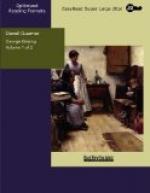Again there was silence, and before the conversation could be renewed there came a summons to supper.
A vivacious political dialogue between Mr. Liversedge and his relative allowed Glazzard to keep silence, save when he exchanged a few words with his hostess or Miss Pope. He had a look of extreme weariness; his eyes were heavy and without expression, the lines of face slack, sullen; he seemed to maintain with difficulty his upright position at the table, and his eating was only pretence. At the close of the meal he bent towards Mrs. Liversedge, declared that he was suffering from an intolerable headache, and begged her to permit his immediate departure.
Denzil went with him out into the road.
“I could see you were not well,” he said, kindly. “I want to have a long and very serious talk with you; it must wait till after to-morrow. You know, of course, what I have on my mind. Come and hear my balderdash if you are all right again.”
All the next day Denzil was in extravagant spirits. In the morning he made a show of shutting himself up to meditate the theme of his discourse, but his sister presently saw him straying about the garden, and as soon as her household duties left her at leisure she was called upon to gossip and laugh with him. The Polterham Examiner furnished material for endless jesting. In the midst of a flow of grotesque fancies, he broke off to say:
“By-the-bye, I shall have to run over to Paris for a few weeks.”
“What to do there?”
“A private affair. You shall hear about it afterwards.”
And he went on with his mirthful fantasia. This mood had been frequent with him in earlier years, and his sister was delighted to see that he preserved so much of youth. After all, it might be that he had found his vocation ere it was too late. Certainly he had the gift of speech, and his personality was not a common one. He might strike out a special line for himself in Parliament. They must make his election a sure thing.
The lecture was at eight. About seven, Mr. Liversedge and his relative walked off to the Institute, and entered the committee-room. Two or three gentlemen had already arrived; they were no strangers to Denzil, and a lively conversation at once sprang up. In a few minutes the door again opened to admit Mr. William Glazzard. The chairman of the evening came forward with lounging steps. Regardless of the others present, he fixed his eye upon Quarrier, and examined him from head to foot. In this case, also, introduction was unnecessary.
“You have lost no time,” he remarked, holding out his hand, and glancing from the young man to Mr. Liversedge.
“Your brother has given you a hint?” said the latter.
“Oh yes! How am I to phrase my introductory remarks?”
“Quite without reference to the political topic.”
The others murmured an approval.
“Eustace well again?” asked Quarrier. “He went home with a bad headache last night.”




